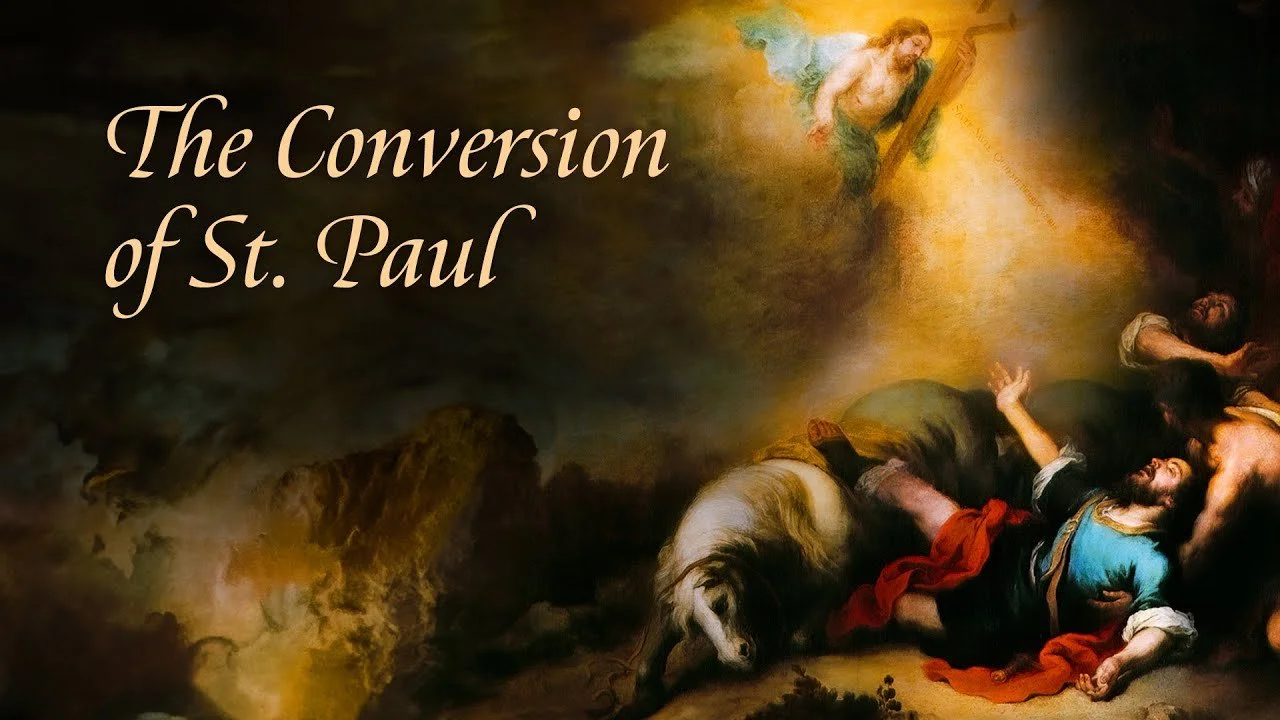
Paul the Apostle An Unlikely Disciple of Jesus
What does a disciple of Jesus look like? Can a disciple of Jesus be any person, no matter what? Are there aspects of our past that disqualify us from discipleship? Can anyone be a disciple of Jesus? Can we disciple anyone to follow Jesus?
Discipleship is for every follower of Jesus, regardless of our past failures or life choices before we knew Jesus.
There are few greater examples of this “anyone can be a disciple” than the Apostle Paul. While Paul, formerly called Saul, maligned those of God’s household, God still called Saul and used him as Paul to grow his church, planting many churches throughout the Roman world, and to be a missionary to the Gentiles as he planted churches everywhere and made disciples of Jesus of every people and of all nations.
Jesus defined discipleship saying, “A disciple is not above his teacher, nor a servant above his master. It is enough for the disciple to be like his teacher, and the servant like his master. If they have called the master of the house Beelzebul, how much more will they malign those of his household.” (Matthew 10:24-25, ESV).
Paul had once been a persecutor of God’s church, and now he was obedient to Jesus’ call to build his church and to make disciples, just like Jesus did and taught us to do in his great commission.
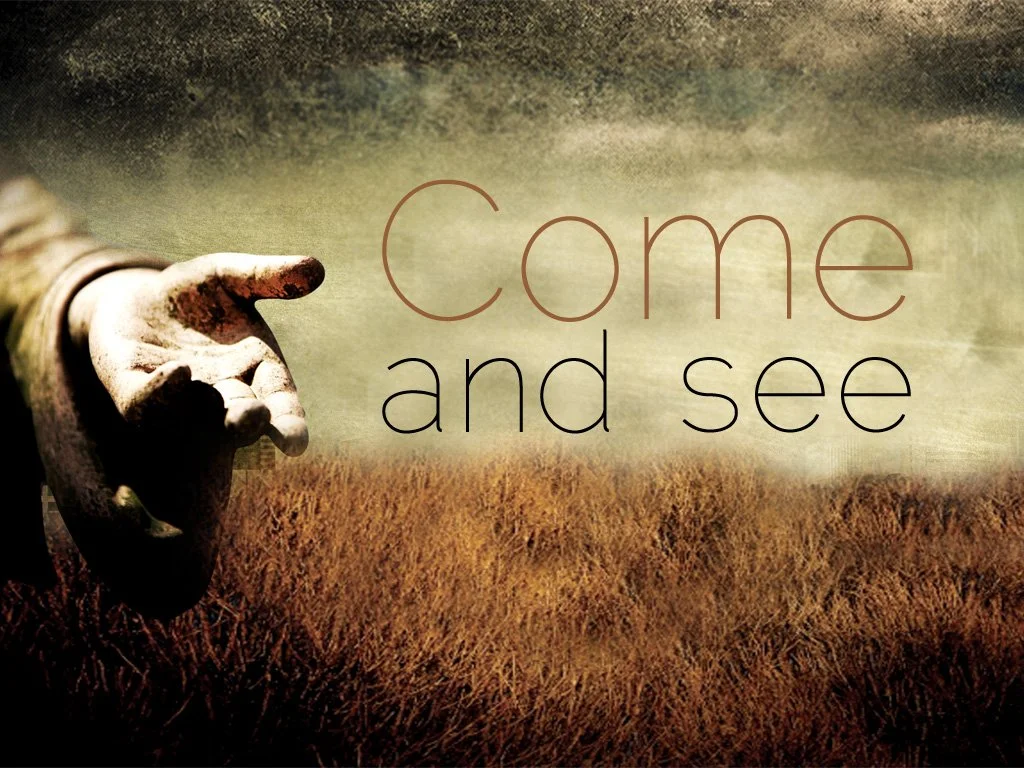
Come and See
What are you looking for? If you were following Jesus around and he turned to you and asked, “What are you seeking?” What would you say to him? And if Jesus said, “Come and you will see”, would you follow him?
We are all looking for something. We are curious and seeking more in this life. Everything we are looking for in this life is satisfied in Jesus Christ. When we come and see Jesus, we find everything else in him.
In John’s Gospel account, when Jesus came from Galilee to the Jordan, John the Baptizer saw Jesus and proclaimed to two of his disciples “‘Behold, the Lamb of God!’ The two disciples heard him say this, and they followed Jesus. Jesus turned and saw them following and said to them, ‘What are you seeking?’ And they said to him, ‘Rabbi’ (which means Teacher), ‘where are you staying?’ He said to them, ‘Come and you will see.’ So they came and saw where he was staying, and they stayed with him that day, for it was about the tenth hour.” (John 1:35-39, ESV).
John the Baptist’s disciples became Jesus’ disciples when they encountered the Lamb of God. These two men, most likely Andrew and John, were seeking Jesus. They were curious about Jesus. They wanted to know more about Jesus. They wanted to see where Jesus was going. They wanted to follow Jesus. They wanted to come and to see Jesus.

The Baptismal Waters
What is the significance of baptism? What can we learn about God through Jesus’ baptism? What is the significance of the baptismal waters?
God calls every believer to the waters of baptism. Jesus taught us to baptize in Matthew 28:19 saying, “So go and make followers of all people in the world. Baptize them in the name of the Father and the Son and the Holy Spirit.”
Jesus himself was obedient and was baptized.
Matthew’s Gospel tells us the significance of baptism and Jesus’ baptism. Matthew tells us, “And when Jesus was baptized, immediately he went up from the water, and behold, the heavens were opened to him, and he saw the Spirit of God descending like a dove and coming to rest on him; and behold, a voice from heaven said, ‘This is my beloved Son, with whom I am well pleased.’” (Matthew 3:16-17, ESV).
When Jesus was baptized the Spirit of God descended upon him and the Holy Spirit of God rested upon him as God the Father affirmed that Jesus is his beloved.

The Wisdom of Seeking Jesus
What or who are you seeking? What or who should you be seeking? What is worth seeking? When you find what you have been seeking will you be fulfilled and satisfied?
We are all seeking something in our lives. Not everything we seek is equal in value or importance. Some things are worth seeking and some things are not.
As followers of Jesus we are to seek Jesus and his life for us.
When we seek Jesus we find all that we have ever been looking for and more.
The gospel of Matthew tells us “Now after Jesus was born in Bethlehem of Judea in the days of Herod the king, behold, wise men from the east came to Jerusalem, saying, ‘Where is he who has been born king of the Jews? For we saw his star when it rose and have come to worship him.’” (Matthew 2:1-2, ESV).
After Jesus was born, wise men from the east came looking for King Jesus to worship him.
As the saying goes, “Wise men still seek Jesus.”

Love and Obedience
What is the relationship between love and obedience? Can we obey someone without love? Can we love someone without obeying them? How about in our relationship with God? Can we love God and not obey God? Can we obey God and not love God?
Love and obedience go together. We cannot love God and not obey what God commands us to do.
Joseph loved God and obeyed God even when it was difficult, confusing, and frightening.
The Gospel of Matthew tells us “Now the birth of Jesus Christ took place in this way. When his mother Mary had been betrothed to Joseph, before they came together she was found to be with child from the Holy Spirit. And her husband Joseph, being a just man and unwilling to put her to shame, resolved to divorce her quietly. But as he considered these things, behold, an angel of the Lord appeared to him in a dream, saying, ‘Joseph, son of David, do not fear to take Mary as your wife, for that which is conceived in her is from the Holy Spirit. She will bear a son, and you shall call his name Jesus, for he will save his people from their sins.’ All this took place to fulfill what the Lord had spoken by the prophet: ‘Behold, the virgin shall conceive and bear a son, and they shall call his name Immanuel’ (which means, God with us). When Joseph woke from sleep, he did as the angel of the Lord commanded him: he took his wife, but knew her not until she had given birth to a son. And he called his name Jesus.” (Matthew 1:18-25, ESV).
Joseph was a just man who obeyed God in exercising justice. Even before Joseph heard from God and took Mary as his wife, Joseph treated Mary with dignity and care even in the face of the unknown and skeptical.
Joseph awoke from his sleep and obeyed the angel, the messenger of God, and did what he commanded - “He took his wife, but knew her not until she had given birth to a son. And he called his name Jesus.”

Searching and Finding
What are you looking for? Who are you looking for? What are you looking to see and to find in your searching? Who are you hoping to find in your searching? What keeps you from seeking, seeing, and finding God?
Most of us feel like we are searching for something more in this life. We can find ourselves seeking and searching for God and God’s joy, God’s presence, God’s purpose, God’s hope, and God’s peace.
The people of the first-century were seeking the messiah who was to come and to bring the hope of God, the peace of God, and the joy of God and his kingdom. John the Baptist was the forerunner of Jesus the Messiah who would bring God’s hope, peace, and joy, fulfilling Isaiah as the voice who cries: “In the wilderness prepare the way of the Lord; make straight in the desert a highway for our God.” (Isaiah 40:3, ESV). After his imprisonment, however, John doubted Jesus and questioned if he was the one or should they look for another.
The Gospel of Matthew tells us of John the Baptist’s search for God. Matthew tells us, “Now when John heard in prison about the deeds of the Christ, he sent word by his disciples and said to him, ‘Are you the one who is to come, or shall we look for another?’ And Jesus answered them, ‘Go and tell John what you hear and see: the blind receive their sight and the lame walk, lepers are cleansed and the deaf hear, and the dead are raised up, and the poor have good news preached to them. And blessed is the one who is not offended by me.” (Matthew 11:2-6, ESV).
When we are disappointed and when life does not go as we had planned or had hoped, it is easy to get discouraged and to doubt and to question God. John saw his imprisonment and circumstances and was blinded to the work of God and the person of God who was right there before him.
Instead of rebuking John, Jesus encouraged John with the joy and the hope that was before him and invited him to see what he was looking for—Jesus the Messiah. Jesus was inviting John to see that he was the fulfillment of the Prophet Isaiah, who John was also fulfilling.

Preparing the Way for Peace
How are you preparing the way for peace in your life? What does preparing the way for God and God’s peace look like?
We are called to prepare the way for God and God’s peace in our lives.
In the Gospel of Matthew, the word of God tells us, “In those days John the Baptist came preaching in the wilderness of Judea, ‘Repent, for the kingdom of heaven is at hand.’ For this is he who was spoken of by the prophet Isaiah when he said, ‘The voice of one crying in the wilderness: ‘Prepare the way of the Lord; make his paths straight.’” (Matthew 3:1-3. ESV)
There are many obstacles and barriers to God’s presence and peace in our lives and in this fallen world. The pathway of God’s presence and peace can be crooked and uneven.
As followers of Jesus, we are called to repentance and to making the path of God’s presence and peace straight and level.

Waiting on God’s Hope
Are you waiting on the hope of God? What hope are you waiting for God to bring?
We can all find ourselves looking for hope at some point in our lives. We can feel hopeless in a sinful and fallen world. We long for something more and something better than this broken world.
C.S. Lewis said it this way, “If we find ourselves with a desire that nothing in this world can satisfy, the most probable explanation is that we were made for another world” (C.S. Lewis).
We have a homesickness for another desire and for another world where there is hope of something better and a hope for more satisfying realities. We hope for God and God’s coming kingdom of hope.
The Prophet Isaiah proclaimed, “‘Come, let us go up to the mountain of the Lord, to the house of the God of Jacob, that he may teach us his ways and that we may walk in his paths.’ For out of Zion shall go forth the law, and the word of the Lord from Jerusalem. He shall judge between the nations, and shall decide disputes for many peoples; and they shall beat their swords into plowshares, and their spears into pruning hooks; nation shall not lift up sword against nation, neither shall they learn war anymore. O house of Jacob, come, let us walk in the light of the Lord.” (Isaiah 2:3-5, ESV).
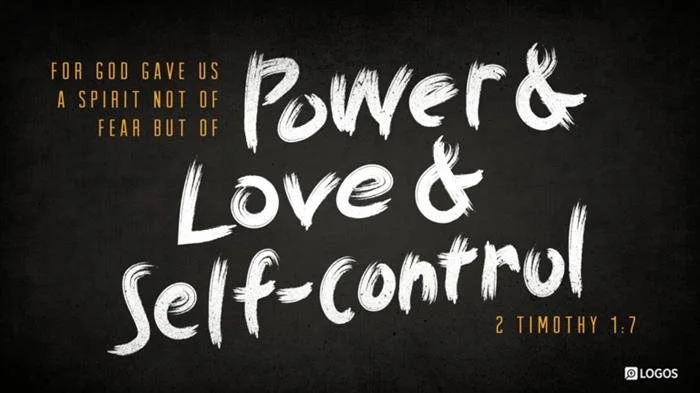
Fanning the Flame of Faith
Fanning the Flame of Faith
Where did you find the faith? Where did your faith come from? How are you fanning the flame of the faith that has been entrusted to you?
Our faith in Jesus is a legacy of faith that has been passed down to us through the generations. Because we have been entrusted with this faith, we should be fanning the flame of the fire of this faith and pass the torch of this flame of faith to the next generation.
In his letter of 2 Timothy 1, the Apostle Paul wrote about this truth to his young disciple, and partner in ministry, Timothy, saying, “I am reminded of your sincere faith, a faith that dwelt first in your grandmother Lois and your mother Eunice and now, I am sure, dwells in you as well. For this reason I remind you to fan into flame the gift of God, which is in you through the laying on of my hands, for God gave us a spirit not of fear but of power and love and self-control.” (2 Timothy 1:5-7, ESV).
Like Timothy, our faith in Jesus was passed down to us through others in our life. We are to boldly and courageously proclaim this faith through the power of God’s Spirit and with great love.
May we fan into flame the legacy of the faith that has been entrusted to us as we cultivate our faith in Jesus and pass the torch of faith to the next generation.
A Collect for the Seventeenth Sunday after Pentecost, or the Sixteenth Sunday after Trinity (Proper 22): “Keep, O Lord, your household the Church in continual godliness, that through your protection it may be free from all adversities, and devoutly serve you in good works, to the glory of your Name; through Jesus Christ our Lord, who lives and reigns with you and the Holy Spirit, one God, now and for ever. Amen.” (Book of Common Prayer, 2019).

Happy Thanksgiving from the Pruitts!
Happy Thanksgiving from the Pruitts!
We are praying you have a blessed and peaceful Thanksgiving with family and friends.
The Psalmists wrote of giving thanks, saying, "Oh give thanks to the LORD, for he is good, for his steadfast love endures forever!" (Psalm 107:1 and Psalm 136:1)
Giving thanks was so important to the early church that the Apostle Paul wrote the churches in Ephesus, Thessalonica, and Colossae, encouraging them to be thankful with these words:
"Always giving thanks for everything to God the Father in the name of our Lord Jesus Christ" (Ephesians 5:20).
"Give thanks in all circumstances; for this is God's will for you in Christ Jesus" (1 Thessalonians 5:18).
"And whatever you do, whether in word or deed, do it all in the name of the Lord Jesus, giving thanks to God the Father through him" (Colossians 3:17).
We hope and pray you have time to enter into thanks this Thanksgiving week as you share all that you have to be thankful for with family and friends and as you turn those thanks back to God in worship and praise as you "give thanks to the LORD, for he is good, for his steadfast love endures forever!" (Psalm 107:1)
We are thankful to God for each of you!
Thanksgiving blessings and peace,
The Pruitts
A Collect for Thanksgiving Day, Canada and United States of America: “Most merciful Father, we humbly thank you for all your gifts so freely bestowed upon us: for life and health and safety, for strength to work and leisure to rest, for all that is beautiful in creation and in human life; but above all we thank you for our spiritual mercies in Christ Jesus our Lord; who with you and the Holy Spirit lives and reigns, one God, for ever and ever. Amen.” (Book of Common Prayer, 2019).

An Approved Worker
Do you see your faith as work? Are you a worker of your faith? Are you working on your faith? Is the work you are doing approved by God? Are you a worker approved by God?
We have been saved by grace through faith, see Ephesians 2:8-9; however, our faith requires work.
Paul wrote the church in Ephesus saying, “For we are his workmanship, created in Christ Jesus for good works, which God prepared beforehand, that we should walk in them” (Ephesians 2:10, ESV).
The Apostle Paul wrote the church in Philippi expressing this truth when he said, “Therefore, my beloved, as you have always obeyed, so now, not only as in my presence but much more in my absence, work out your own salvation with fear and trembling” (Philippians 2:12, ESV).
Dallas Willard expressed this theological truth in The Great Omission: Reclaiming Jesus's Essential Teachings on Discipleship, saying, “Grace is not opposed to effort, it is opposed to earning. Earning is an attitude. Effort is an action. Grace, you know, does not just have to do with forgiveness of sins alone.”
While we do not work to earn our salvation, we do the work of our salvation as we obey God and as we do the work of our faith, living out the will of God, studying the word of God, and putting the word of God and our faith into practice in our daily lives.

Living in Light of Eternity
What motivates how you live? What motivates the choices you make or do not make in your life? What are you moving away from and what are you moving toward in your life? What is your primary mover, your purpose, your driving force, your why, or your motivation for your life?
As followers of Jesus, we are called to move away from what brings about death, judgement, and loss, and we are to move toward what brings about eternal life and gives eternal purpose.
In his first letter to Timothy, the Apostle Paul wrote to his young disciple Timothy, encouraging him to live in light of eternity, saying, “But as for you, O man of God, flee these things. Pursue righteousness, godliness, faith, love, steadfastness, gentleness. Fight the good fight of the faith. Take hold of the eternal life to which you were called and about which you made the good confession in the presence of many witnesses.” (1 Timothy 6:11-12, ESV).
Not all opportunity and choices are equal or have the same weight of eternal purpose or the lasting reward of eternal life. We are to flee from meaningless pursuits, empty decisions, and damaging choices that bring about death and judgement and we are to pursue that which brings about eternal life and eternal purpose.

Lost Things
Have you ever lost something important or valuable? How have you responded to loosing something that you love? What makes loosing something or someone so frightening or serious? What is the appropriate response to loosing something or someone important?
Most of us have experienced loosing something or someone important or valuable to us. Some of us have even been lost ourselves.
The important thing about lost things and lost people is they can be found.
In Luke chapter fifteen, Jesus told the parables of the lost sheep, the lost coin, and the lost sons in response to the tax collectors and sinners who were all drawing near to hear him, and the Pharisees and the scribes grumbled, saying, ‘This man receives sinners and eats with them.’” (Luke 15:1-2, ESV).
In The Parable of the Lost Sheep, the shepherd leaves the 99 sheep and finds the one lost sheep. Jesus says, “And when he [the shepherd] comes home, he calls together his friends and his neighbors, saying to them, ‘Rejoice with me, for I have found my sheep that was lost.’ Just so, I tell you, there will be more joy in heaven over one sinner who repents than over ninety-nine righteous persons who need no repentance.” (Luke 15:6-7, ESV).
In The Parable of the Lost Coin Jesus says, “Or what woman, having ten silver coins, if she loses one coin, does not light a lamp and sweep the house and seek diligently until she finds it?” Jesus concludes the parable saying, “Just so, I tell you, there is joy before the angels of God over one sinner who repents.” (Luke 15:8-10, ESV).
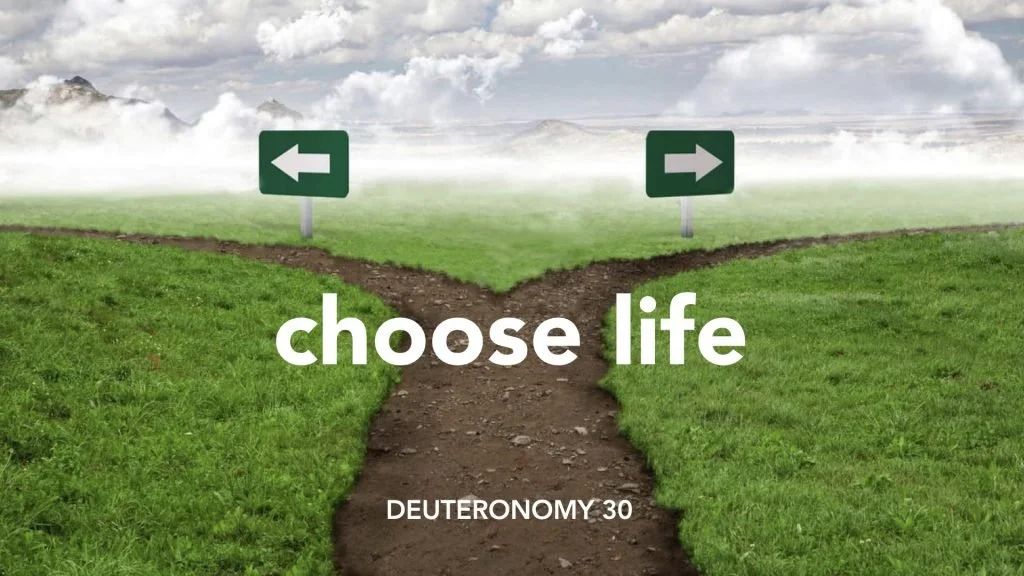
Discipleship: Choosing God’s Life
What kind of choice is discipleship? What are we choosing when we choose to be followers of Jesus?
Being a follower of Jesus, a disciple of Jesus, is choosing God’s life for us over and above choosing our own way of life. When we choose God’s life for us, we choose to really live.
In the fifth book of the law, Deuteronomy, God spoke to Moses and the people of Israel, saying, “See, I have set before you today life and good, death and evil. If you obey the commandments of the Lord your God that I command you today, by loving the Lord your God, by walking in his ways, and by keeping his commandments and his statutes and his rules, then you shall live and multiply, and the Lord your God will bless you in the land that you are entering to take possession of it.” (Deuteronomy 30:15-16, ESV).
Following God and his law leads to life and blessing.
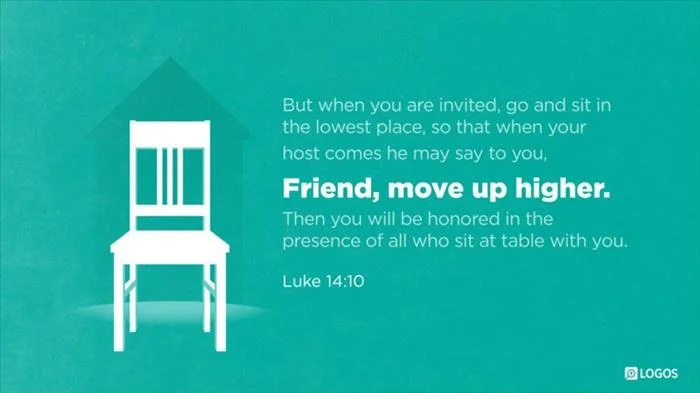
Humility and Getting Low
Is it difficult or easy for you to be at the center of attention? Are you comfortable in low places of simplicity and humility, or do you require visible honor and places of prominence? What is humility and how do we pursue humility in our lives?
At the heart of humility is a true understanding of ourselves in light of who God is. Humility is seeing God and others as being greater than ourselves. We should seek humility and to be honored by God above self-honor or the accolades of others.
Jesus speaks of humility in the parable of the wedding feast in Luke 14:7-11, saying, “For everyone who exalts himself will be humbled, and he who humbles himself will be exalted.” (Luke 14:11, ESV).
We can think too highly of ourselves, exalting ourselves, and be humbled; or we can humble ourselves before God and others, allowing God by his grace and generosity to exalt us in our humility through his humility and goodness to us.
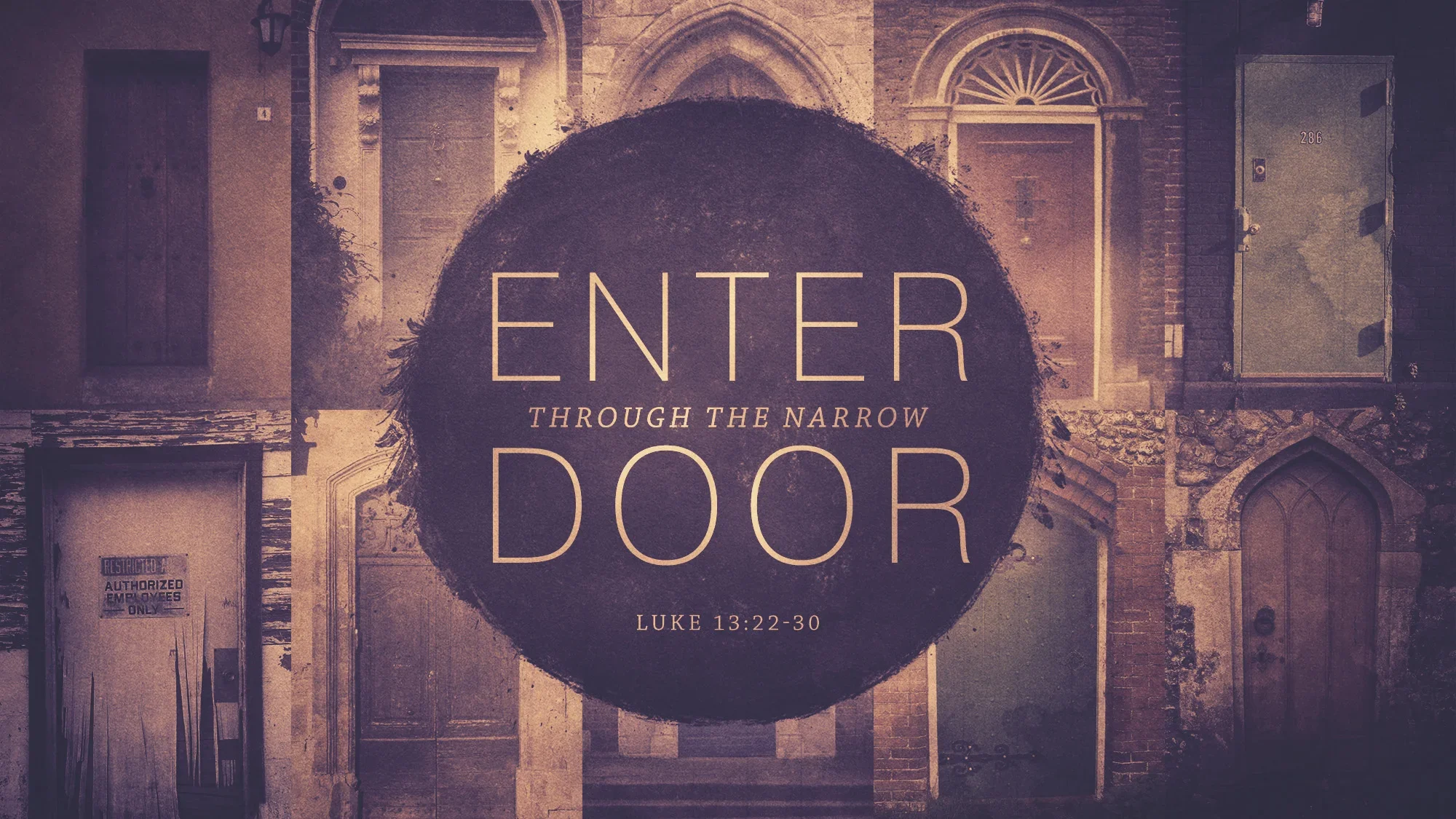
Entering Through the Narrow Door
What is the most difficult door you have ever had to step through? Have some of the hardest doorways to go through led you to the most beneficial places?
It is often the case that the most difficult doorways to enter through provide some of the moist rewarding destinations and opportunities.
In Luke’s gospel account Jesus “went on his way through towns and villages, teaching and journeying toward Jerusalem. And someone said to him, “Lord, will those who are saved be few?” (Luke 13:22-23, ESV).
Jesus taught them saying, “Strive to enter through the narrow door. For many, I tell you, will seek to enter and will not be able. When once the master of the house has risen and shut the door, and you begin to stand outside and to knock at the door, saying, ‘Lord, open to us,’ then he will answer you, ‘I do not know where you come from.’” (Luke 13:23-25, ESV).
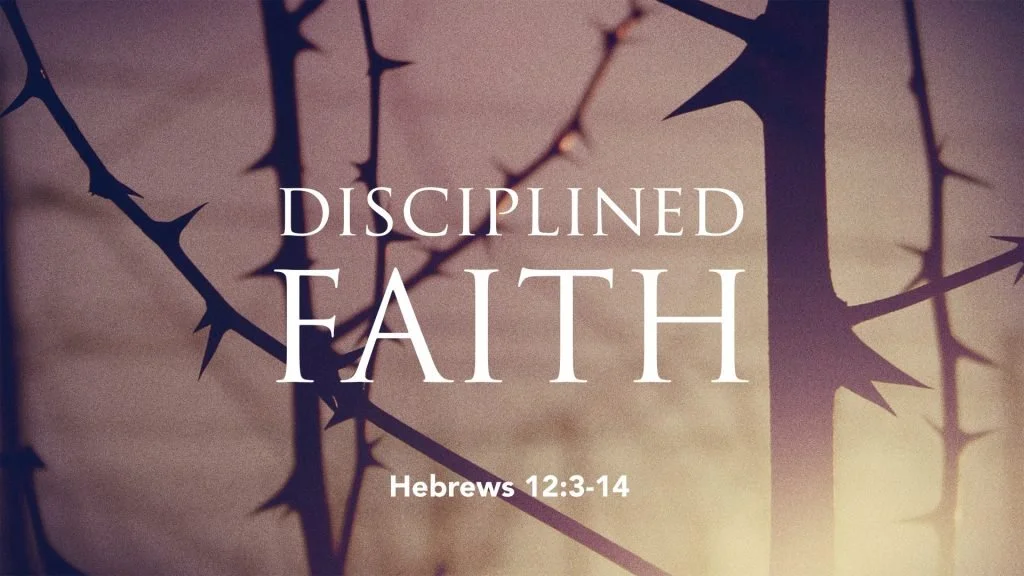
A Disciplined Faith
What is discipline? Why does discipline matter? How important is it to be disciplined? Is it important for our faith to be disciplined? In what ways is discipline a part of discipleship, holiness, and maturity in our relationship with Jesus?
At the root of discipline is instruction, correction, or teaching. Discipline helps move us toward holiness and being more like Jesus. To discipline means to teach.
A disciple is a learner or a student. Students and learners grow and mature and move toward holiness. When we are corrected, we learn and we grow. When we learn and we grow we become more holy. And when we become more holy, we see God more clearly as we become more like him.
Discipline is essential for the disciple of Jesus.

God’s Kingdom and Service
Are we afraid to serve God and his kingdom? What does serving God’s kingdom look like? What reservations or fears do we have related to serving God and his kingdom?
It can be frightening and difficult to serve God and to do his kingdom work in the world. It can be costly to serve God and to do his kingdom work.
In the gospel of Luke, Jesus tells us, “Fear not, little flock, for it is your Father's good pleasure to give you the kingdom. Sell your possessions, and give to the needy. Provide yourselves with moneybags that do not grow old, with a treasure in the heavens that does not fail, where no thief approaches and no moth destroys. For where your treasure is, there will your heart be also.” (Luke 12:32-34, ESV).
God does not want us to be afraid. God wants to give us his kingdom. If we were not afraid and if we trusted God’s kingdom provision, we would serve God with our lives without hesitation, reservation, or fear, and no matter the cost.

Rich Toward God
What is your true net worth? What riches do you have? Are you content with what you have, or do you want more? Are you rich toward God, or do you keep all your riches for yourself?
God has blessed us with so much. We have everything we need and then some. Even though God has provided so much for us, we can have the tendency to want more and to not share what we have.
In the Parable of the Rich Fool, in Luke 12:13-21, Jesus warned of covetousness, saying, “Take care, and be on your guard against all covetousness, for one's life does not consist in the abundance of his possessions.” (Luke 12:15, ESV).
We are not what we own. Covetousness leads to us wanting what is not ours and leads to be owned by what we own. We can possess our possessions or we can be possessed by our possessions.

Prayer is Asking, Seeking, and Knocking
Do you pray? How do you pray? How are you supposed to pray? Are you persistent in prayer?
As followers of Jesus, we are supposed to pray. In Luke 11:1-13 Jesus taught his disciples how to pray, saying “When you pray, say: ‘Father, hallowed be your name. Your kingdom come.” (Luke 11:1-2, ESV). It is not if you pray, but when you pray. Prayer is assumed for the believer.
We are supposed to pray to God as our Father. We are supposed to ask God for his kingdom to come, for what we need, for forgiveness of sin, for forgiveness of others, and to be led away from temptation. (Luke 11:2-4, ESV).
We can approach God in prayer as a friend who cares about us and our needs and who will meet our needs when we come to him.
Jesus said this about prayer: “And I tell you, ask, and it will be given to you; seek, and you will find; knock, and it will be opened to you. For everyone who asks receives, and the one who seeks finds, and to the one who knocks it will be opened. What father among you, if his son asks for a fish, will instead of a fish give him a serpent; or if he asks for an egg, will give him a scorpion? If you then, who are evil, know how to give good gifts to your children, how much more will the heavenly Father give the Holy Spirit to those who ask him!” (Luke 11:9-13, ESV).